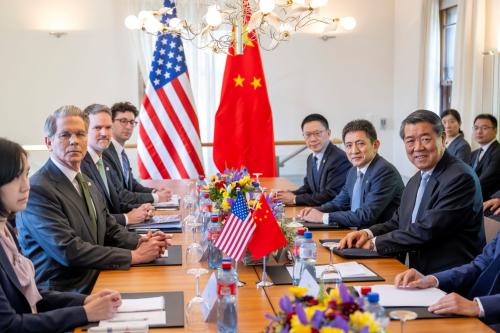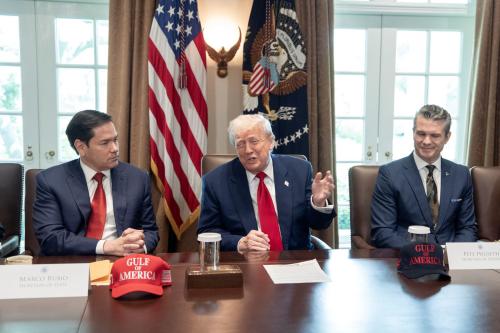Japan’s prime minister, Shinzo Abe, made the rounds of Washington today (February 22nd). He laid a wreath at Arlington National Cemetery (implicitly honoring those who lost their lives fighting Imperial Japan in World War II). He and President Obama had a full discussion of security and economic ties. And late this afternoon, Abe spoke at the Center for Strategic and International Studies.
President Obama endorsed the U.S.-Japan alliance as “the central foundation for our regional security,” and Prime Minister Abe emphasized later that it worked to mutual benefit of the two countries. Obama told Abe that he would have “a strong partner in the United States throughout your tenure” – a validation that will no doubt enhance his political standing back home. The two leaders were on the same page regarding the need for “strong actions” regarding the recent nuclear test by North Korea, and they specifically discussed financial sanctions.
Obama and Abe discussed the proposal that Japan join the U.S.-led Trans-Pacific Partnership, a major, new rule-setting effort in the field of regional economics and trade. Washington wants Japan to be prepared to include all relevant issues, especially market access for American farm products. The two governments confirmed that understanding, but the United States also reaffirmed that Japan would not have to make fundamental concessions even before the negotiations began. Thus, progress was made, but a lot of work remains to be done.
On recent tensions between China and Japan in the East China Sea, Abe publicly reaffirmed Japan’s adherence to its position that as a matter of history and international law, the Senkaku/Diaoyu Islands are Japan’s sovereign territory. He received from Secretary of State Kerry a reiteration of U.S. statements that those islands are within the territorial scope of the U.S. defense commitment to Japan and that the United States is opposed to unilateral efforts to undermine Japan’s administrative control of the islands. Yet Abe also pledged that Japan would continue to act in a “reserved manner,” that it would not initiate an escalation of the conflict, and that Tokyo was open improving its important relationship with China.
For the short term, U.S. expectations from the summit were probably low. Abe’s Liberal Democratic Party faces elections for half the seats of the Upper House of the Diet (legislature) in July. Winning a majority in that election and so ending divided government in Tokyo is very important for Mr. Abe. He was not about to make bold initiatives in Washington that could hurt him back home (on TPP, for example), but the United States has an interest in a Japanese government that can work to meet the many challenges that faces it.
Over the longer term, the Obama administration expects more than a good set of meetings. It hopes that Japan will bear its part of the burden of preserving peace, stability, and prosperity in East Asia and the world, and that there would be close coordination and cooperation on how to manage China’s rise on issues large and small. In that regard, Abe pledged new action on the security relationship but also a renewed commitment to a positive and constructive global and regional role. Abe’s simple message was that, after several years of uncertainty about Tokyo’s future trajectory, Japan “was back,” and contrary to the doubts of some Americans, it would remain a first-tier country.
The Brookings Institution is committed to quality, independence, and impact.
We are supported by a diverse array of funders. In line with our values and policies, each Brookings publication represents the sole views of its author(s).



Commentary
Shinzo Abe’s Visit to Washington
February 22, 2013